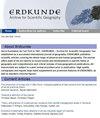On the path to sustainable energy landscapes? The social shaping of energy landscapes in the face of climate protection measures
IF 1.1
4区 社会学
Q3 GEOGRAPHY
引用次数: 1
Abstract
Potential spatio-temporal patterns of renewable energies that take into account international climate protection strategies have been neither analysed nor visualised exactly in terms of their landscape complexity. Furthermore, it is unclear what land uses would be prevalent in new energy landscapes, due to a lack of restrictions, and which social conflicts would be associated with these land use changes. There is no knowledge at all about the extent to which existing land use, which has emerged from a capitalistic order, affects the achievement of a carbon-neutral and socially just society. It is also not clear how far it is possible to identify alternative spatial patterns of sustainable energy transition by altering spatial restrictions concerning renewable energies. For this reason, we want to model and visualise a regional energy landscape that corresponds to the objectives of the UN Climate Conference in terms of its regional greenhouse gas balance in the electricity sector. In this regard, the study provides a detailed analysis of the landscape transformations that would occur in rural spaces if those values which attempt to link energy transition to the Paris Agreement were to prevail. The analyses reveal that a strict orientation of the expansion of renewable energies towards climate protection goals would strongly mechanise rural areas, thus significantly transforming their social patterns.在通往可持续能源景观的道路上?面对气候保护措施,能源景观的社会塑造
考虑到国际气候保护战略的可再生能源的潜在时空模式,既没有从其景观复杂性的角度进行准确的分析,也没有进行可视化。此外,由于缺乏限制,目前尚不清楚新能源景观中哪些土地利用将普遍存在,哪些社会冲突将与这些土地利用变化有关。对于资本主义秩序中产生的现有土地使用在多大程度上影响碳中和的和社会公正社会的实现,我们一无所知。还不清楚通过改变可再生能源的空间限制,在多大程度上可以确定可持续能源转型的替代空间模式。因此,我们希望模拟和可视化一个区域能源景观,该景观符合联合国气候大会在电力部门的区域温室气体平衡方面的目标。在这方面,该研究详细分析了如果那些试图将能源转型与《巴黎协定》联系起来的价值观占上风,农村空间将发生的景观变化。分析表明,严格将可再生能源的扩张导向气候保护目标,将有力地使农村地区机械化,从而显著改变其社会模式。
本文章由计算机程序翻译,如有差异,请以英文原文为准。
求助全文
约1分钟内获得全文
求助全文
来源期刊

Erdkunde
地学-自然地理
CiteScore
2.00
自引率
7.10%
发文量
17
审稿时长
>12 weeks
期刊介绍:
Since foundation by Carl Troll in 1947, ''ERDKUNDE – Archive for Scientific Geography'' has established as a successful international journal of geography. ERDKUNDE publishes scientific articles covering the whole range of physical and human geography. The journal offers state of the art reports on recent trends and developments in specific fields of geography and comprehensive and critical reviews of new geographical publications. All manuscripts are subject to a peer-review procedure prior to publication. High quality cartography and regular large sized supplements are prominent features of ERDKUNDE, as well as standard coloured figures.
 求助内容:
求助内容: 应助结果提醒方式:
应助结果提醒方式:


